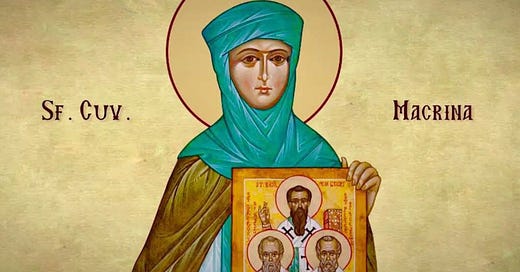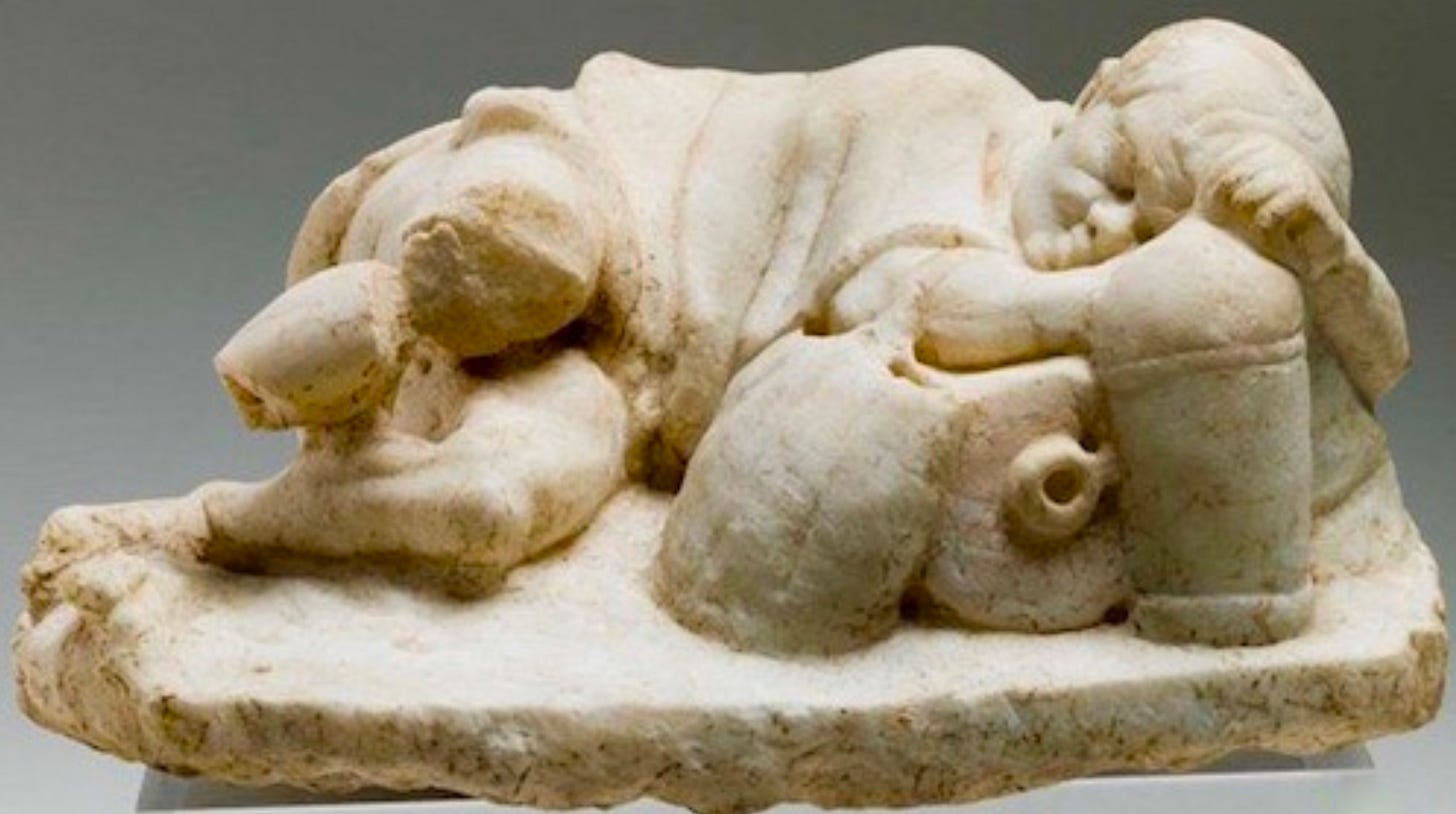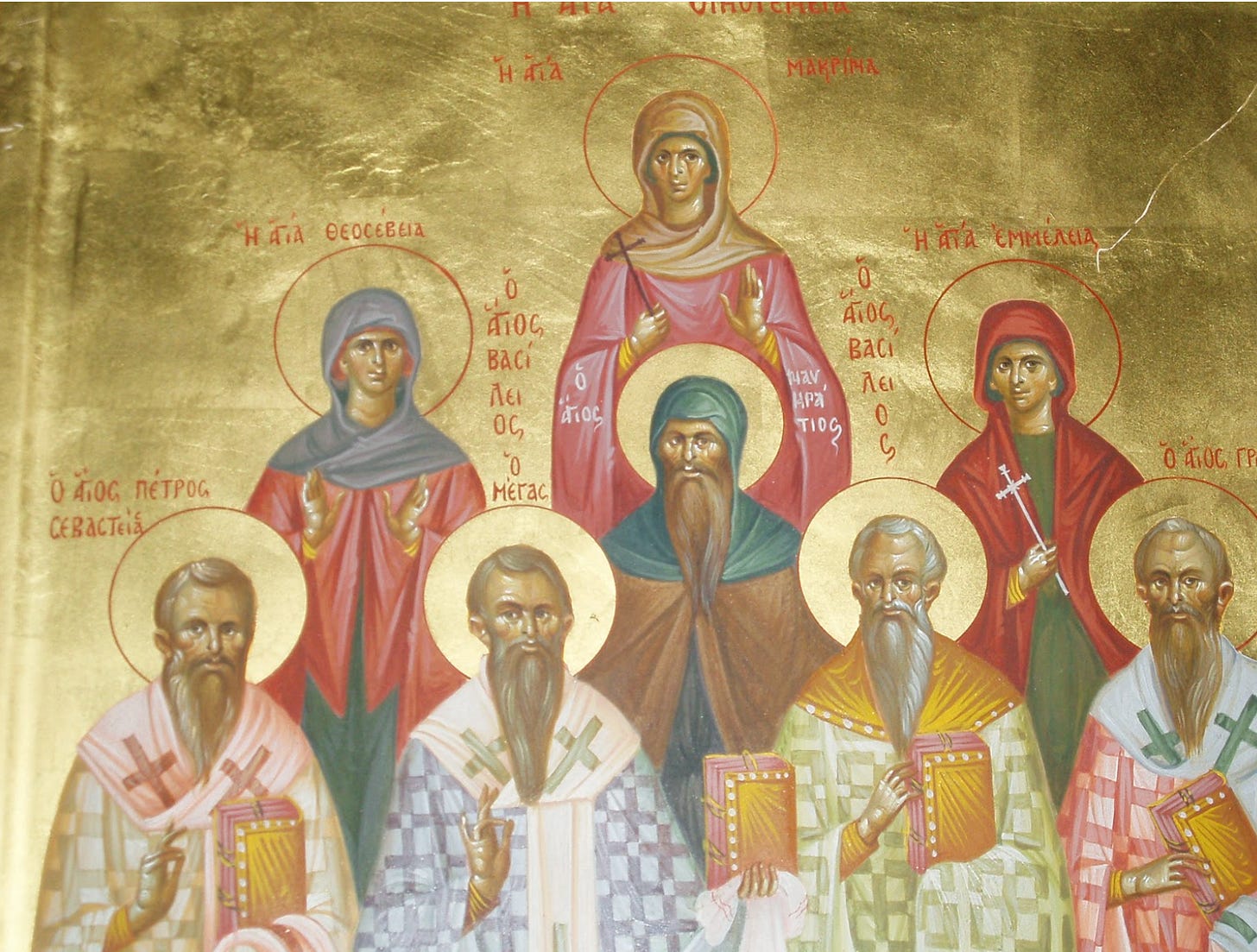From Persecution to Social Care: The Christian Legacy of Macrina and the Cappadocian Fathers
A reflection on the life of Saint Macrina after her feast day, a 4th century woman who inspired a radical embrace of Christian virtue, birthing a pivotal shift towards care for the poor.
On the Edge of an Era
Macrina the Teacher humbly enters the stage in 327 on a razor-sharp edge of history, with intense Christian persecution on one side and Constantine's Christian empire on the other. As Tom Holland unearths in his mammoth book, Dominion, the social norms that had upheld the ancient world were rapidly shifting in a way that could distinctively be attributed to Christianity. Before, the Roman heroes and gods were celebrated for their wealth, power, and force. Strength was the medallion of the day. The weak and needy were despised.
When Christian thinkers like Origen blended elements of Greek philosophy and the order of Roman Bureaucracy with Christian theology, a "universal" faith was born, open to all, despite race, clan, or class. "That an identity might be defined by belief was in itself a monumental innovation". This philosophical stroke of brilliance was ripely received by Constantine and others at a time when the world was globalising and people were ready to throw off their highly regionalised gods and beliefs.
Embedded in this context, we begin to see charity and social care for the poor blossom from traditionally the least expected places: by the wealthy and powerful, many because of their devotion to the Christian faith. Holland stresses the monumentality of such a break with the past, where before the elites would have boasted of status or their ornate bath-houses, but now, caring for the poor was becoming vogue.
Macrina and her family tree paint a picture of this unfolding development (as well as to help bring it about), as their grandparents were martyred for Christ during Roman persecution, while her immediate family, societal elites of Cappadocia, became some of the most influential Christian social reformers the world has seen.
The Cappadocian Fathers
Macrina was the older sister of 10 siblings, including to two of her brothers with the renowned tile of Cappadocian Fathers. St. Basil the Great became the bishop of Caesarea and helped formulate monasticism, championing liturgical prayer and communal life. Basil embarked on a "radical new building project", constructing a massive 'poor house' where the sick and lepers were welcomed, essentially establishing the first hospital. Basil himself, trained in medicine, would tend to lepers himself due to the strong conviction that in serving the least of these, he was serving the crucified Christ.
St. Basil the Great
St. Gregory of Nyssa contributed to the Nicene Creed and much of our understanding of the Trinity. Gregory encouraged people to ponder the dignity and divine value of the poor, noting that Christ chose to live as one of them. Although too radical for his time and not received by the community, in the 300s, this man refused to own slaves and advocated for people to free their own because of the eternal value of each soul.
St. Gregory of Nyss
Furthermore, both of these brothers believed in the renunciation of possessions and earthly comfort, as Gregory says, "Give to the hungry what you deny your own appetite".
Lastly (although her impact on her siblings can be charted beyond), Peter of Sebaste was the youngest of the ten siblings and laid down his professional training in the sciences to form the counterpart for men to Macrina's established order. During a severe famine, his monastery cared for crowds and crowds of hungry civilians. Later on, he would be appointed to the notable position of the Episcopal chair of Sebaste in Armenia and would write and publish books alongside his brothers.
St. Peter of Sebaste
Who was Macrina?
In briefly summarising her life, teenage Macrina was betrothed to an older man who died before her wedding day. She committed the rest of her days to the service of Christ, going on to convince her mother to turn their luxurious estate into a monastery for women dedicated to prayer, community, and service. She sought to live like Christ sacrificially so as to exude the crucifixion.
Macrina died at the age of 55, with Gregory by her side. This deathbed scene is the setting of the book he went on to write called The Life of Saint Macrina.
Here are a few spiritual nuggets and takeaways scattered throughout resources on her life:
Raised on Poetry and Cherished the Psalms
Gregory recounts her unconventional education and the way she poured over the Psalter throughout her life: "The education of the child was her mother's task; she did not, however, employ the usual worldly method of education, which makes a practice of using poetry as a means of training the early years of the child."- Gregory
"Nor was she ignorant of any part of the Psalter, but at stated times she recited every part of it. When she rose from bed, or engaged in household duties, or rested, or partook of food, or retired from table, when she went to bed or rose in the night for prayer, the Psalter was her constant companion, like a good fellow-traveller that never deserted her."
"Father, teacher, guide, mother, counsellor in every good thing"
Holland claims Macrina may be the most influential of all siblings, with Gregory calling her his "father, teacher, guide, mother, counsellor in every good thing".
Having taught and raised her brothers while they were young, she is said to later have confronted Basil about his ego when he returned home from university once, which turned the course of his life:
"He was puffed up beyond measure with the pride of oratory and looked down on the local dignitaries, excelling in his own estimation all the men of leading and position. Nevertheless Macrina took him in hand, and with such speed did she draw him also toward the mark of philosophy that he forsook the glories of this world and despised fame gained by speaking, and deserted it for this busy life where one toils with one's hands. His renunciation of property was complete, lest anything should impede the life of virtue. But, indeed, his life and the subsequent acts, by which he became renowned throughout the world and put into the shade all those who have won renown for their virtue, would need a long description and much time."
Hospitality and an Example to Empty Nesters
While Macrina's family had been materially blessed, she denounced these things once her husband died and formed a monastic order with her mother as a godly use of their estate: "Continence was their luxury, and obscurity their glory. Poverty, and the casting away of all material superfluities like dust from their bodies, was their wealth... Nothing was left but the care of divine things and the unceasing round of prayer and endless hymnody, co-extensive with time itself, practised by night and day... What human words could make you realise such a life as this, a life on the borderline between human and spiritual nature?"
As one podcast I listened to pointed out, female monasticism in the early church was more about inviting people into your home or estate and creating a kind of active community, as opposed to the more separatist approach we might picture. They pointed out that women were often married as teenagers to older husbands, and so they would have almost a whole other life once widowed young.
They drew a parallel with modern empty nesters who often also have a second life once their kids go to college and their primary responsibility is relieved. What an example to see women who would devote their time to creating a hub of goodness where people can come around to be physically and spiritually nourished, to feel a part of something larger together.
Contagious Charity
Her brothers' radical acts of charity were most likely inspired by their sister. At this time in history, there was a common practice of discarding unwanted children in the streets who then grew up to become slaves or prostitutes. While this infanticide remained unquestioned by most of the Roman world at the time, Macrina would pray and walk the streets and even took some of these girls in to raise them herself.
"Moreover her life became such by God's help that her hands never ceased to work according to the commandment. Never did she even look for help to any human being, nor did human charity give her the opportunity of a comfortable existence. Never were petitioners turned away, yet never did she appeal for help, but God secretly blessed the little seeds of her good works till they grew into a mighty fruit."
This complete "subversion of the traditional way of ordering things" cannot be overstated, as Tom Holland insists.
Deathbed Wisdom
While dying, Gregory says she goes on one long gorgeous rambling about what God has taught her throughout her life: "Fever was drying up her strength and driving her on to death, yet she refreshed her body as it were with dew, and thus kept her mind unimpeded in the contemplation of heavenly things, in no way injured by her terrible weakness...how she was uplifted as she discoursed to us on the nature of the soul and explained the reason of life in the flesh, and why man was made, and how he was mortal, and the origin of death and the nature of the journey from death to life again. In all of which, she told her tale clearly and consecutively as if inspired by the power of the Holy Spirit, and the even flow of her language was like a fountain whose water streams down uninterruptedly."
Weaving a Family History of Gratitude
And while rambling, she framed her family legacy through gratitude. This point moves me deeply as we are so prone to see the narrative of only ourselves in the modern age, which can loom large especially when you're dying. And yet, she is able to look at the larger story of what God has been doing in her family history: "She recounted as much as she could remember of the life of our parents and the events that took place both before and after my birth. But her aim throughout was gratitude towards God, for she described our parents' life not so much from the point of view of the reputation they enjoyed in the eyes of contemporaries on account of their riches, as an example of the divine blessing."
Her Intimacy with the Invisible Bridegroom
"Therefore I think she revealed to the bystanders that divine and pure love of the invisible bridegroom, which she kept hidden and nourished in the secret places of the soul, and she published abroad the secret disposition of her heart----her hurrying towards Him Whom she desired, that she might speedily be with Him... For in very truth her course was directed towards virtue, and nothing else could divert her attention."
A few Caveats...
Packed throughout these quotes, you'll find plenty of asceticism which has its shadow sides. From the commands of Christ, we are to strive for more self-control and renunciation, yet the bible remains dynamic. Yet we are also told to enjoy the pleasures of life in Ecclesiastes and commanded to feast throughout the Torah. C.S. Lewis believes that desires aren't to be despised, but instead, many are to be embraced as transcendent traces of what we long for in heaven.
Yet, this time period in Christian history was riddled with dichotomies between the flesh and the spirit, the world and the life of the soul, persisting a disdain towards what is physical. Thankfully, much of this has been reclaimed by the church today, so we can properly see the physical world and our bodies as redeemed entities created by God, where He continually enacts restoration, making all things new.
Embracing the Richness of Saints
Growing up in a protestant community, learning about the lives of saints has been an unfamiliar practice. And yet in an era of celebrity pastors and influencers, it's clear that we have a stubborn tendency of needing people to admire and exemplify. And so why not let it instead be women and men throughout unique moments in history, proven faithful followers through their small or great actions? One of my favourite podcasters, Joy Clarkson, explains that the lives of the saints show us the kaleidoscope of ways a life can bring glory to God, a diversity of goodness. There isn't one way to live or one path.
In the spirit of immersing into scenes from history, hopefully, you can find whispers of inspiration from this story of a 4th-century woman who programmed charity into some of the most prominent figures of the Christian church. Her faithfulness came at just the right moment, as Christianity was first catching the fire of influence in the Roman Empire. Therefore, her actions were able to reverberate out into society at large, seeing the very origins of social welfare, hospitals, and philanthropy spill forth.
Sources:
Dominion by Tom Holland
Joy Clarkson's blog: Wanderings and Ponderings, podcast: Speaking with Joy
- https://joyclarkson.com/home/2020/2/13/church-mothers-and-sisters-and-wives
-https://joyclarkson.com/home/2018/7/19/saint-macrina-and-the-army-of-emotions
The Life of Saint Macrina by Gregory of Nyssa
Two Feminists Annotate the Beatified Podcast
Drinking in the oddities and beauties around me.
Cheers.
Carolyn











